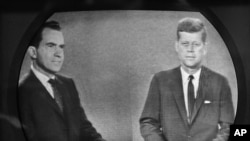Political pundits say the Republican sweep in Tuesdays elections was about voters looking for change. New research suggests the winning candidates' success may have a bit to do with voters looking at their faces.
There’s lots of scientific and anecdotal evidence that voters are more drawn to attractive candidates.
If you are old enough to remember the 1960 U.S. presidential election, it was believed John F. Kennedy’s youthful appearance and vigor swept him into office over Richard Nixon, who appeared sallow and pale in a television debate.
A new study from the Netherlands further breaks down the attractiveness component into facial features that suggest extremes of health and intelligence.
Then, researchers used a computer program to digitally alter the faces of a group of men. Each participant was shown a pair of photos featuring the same man, but the images had been slightly manipulated to have a more or less healthy complexion, or to look more or less intelligent.
The 148 male and female participants were told they had to pick the new head of a company just by looking at the photos.
Brian Spisak is a business and economics professor at VU University in Amsterdam.
“Ultimately we found that in certain situations, people prefer intelligent-looking faces. But across all situations that we tested, people preferred healthy-looking individuals," said Spisak.
In 69 percent of the trials, the participants chose the the candidate who looked healthier. Spisak says they were perceived as more trustworthy, ambitious, likeable and more like a leader.
But when people were told that the executive they were selecting was going to have to oversee a competitive or challenging corporate environment, they tended to choose the man they considered more intelligent.
Spisak says in general terms, the more intelligent face is perceived as more masculine.
But Spisak also says context is everything, and if a candidate wants to run on change like President Barak Obama did in 2008, he better look the part.
Researchers at that time experimented with a generic face they created.
“What we find is younger faces are preferred for times of change. And we found that not using Obama’s face, just using a controlled face that we made up, and then morphing a bit of Obama’s face on to a base face and a bit of McCain’s face on to a base face, what we continually found there that in times of change, they prefer the younger candidate," said Spisak.
Spisak says his research shows it pays for aspiring leaders to look healthy.
The findings are reported in the open-access journal Frontiers in Human Neuroscience.







